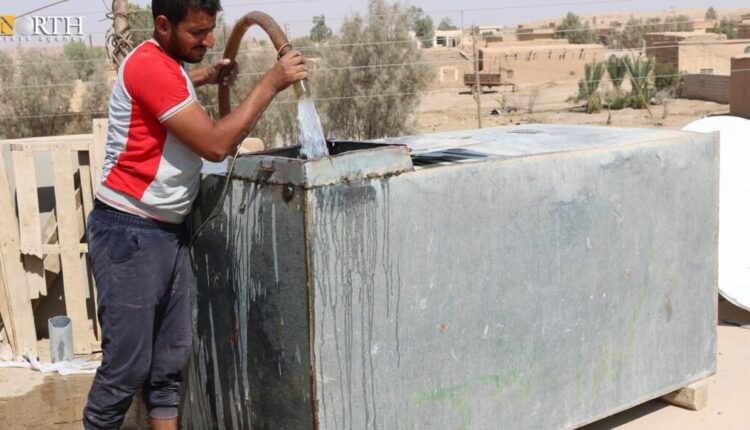
SHADDADI, Syria (North Press) – While filling water from a tanker, Muhammad feels worry about the water that may cause his family members to be infected with cholera, especially he does not know whether it is sterilized or not.
The 30-year-old Muhammad al-Ali, like others from the countryside of the town of Shaddadi south of Hasakah, buys drinking water from tankers, most of which are filled from wells in Hasakah without being subjected to sterilization .
Al-Ali said sometimes he obtains yellow and undrinkable water from tankers which increase his fears amid cholera outbreak in northeastern Syria recently.
For years, residents of Shaddadi and it countryside have been relying on water from tankers of town’s municipality in addition to other private ones contracted with it in light of not restoring the damaged water networks.
Two years before prior to the Syria war, water network was completed to draw water of the Euphrates River from Deir ez-Zor’s countryside to Shaddadi station and water station 47 in the countryside of Shaddadi.
However, the network was destroyed, stealing and went out of service due to fighting between military parties especially Syrian armed opposition factions in 2013 and Islamic State Organization (ISIS) in 2014.
Khader al-Khairy, an official in water department of Shaddadi municipality, said five tankers of the municipality fill drinkable water from desalination plants to be distributed to Shaddadi’s residents.
Meanwhile, 26 tankers contracted with the municipality fill drinkable water from Hasakah’s fountains and wells and distribute it to countryside of the town.
The municipality’s tankers sell five barrels of water for 7.000 Syria pounds (SYP), while private tankers sell the same quantity for 15.000 SYP.
Al-Khairi confirmed that sterile supplies are added to tankers’ water to prevent spreading diseases in coordination with local organization.
The Shaddadi’s medical clinic receives daily between 15 to 20 poisoning and dehydration cases, mostly children and elderly, according to administration.
Muhammad Juma’a, an administrator in the clinic, noted that there are confirmed cases of cholera and other suspected ones that have been referred to Hasakah hospitals.
Juma’a confirmed that the reason after recording poisoning and dehydration cases is having contaminated vegetables and undrinkable water.
On October 21, Najat Rochdi, deputy of UN Special envoy for Syria,said that the humanitarian working group of the International Support Syria Group warned that the cholera could become “catastrophic.”
The 47 -year-old Rami al-Hussein’s children recently have suffered from dehydration and poisoning.
The doctor told him that the reason was due to eating contaminated food and drinking water.
The man stressed the need to observe water sources the tankers are filled with.
